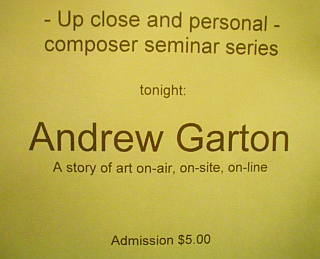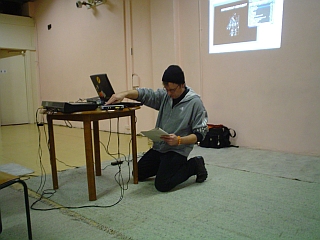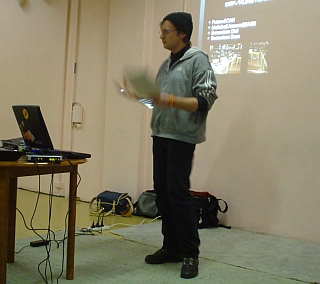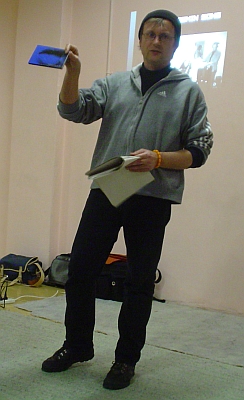Lecture: Art on-air, on-line, on-site


[Extract from lecture notes]
Early 1995 I began working with the notion of a score that would be non-repetitive, that would be some how be different for every performance, both via the Internet and in real-time. The ideas were largely fostered by my experiments with improvised, systems compositions in the 80s. They would take the form of real-time audio collage and would also send me on a parallel research path: generative music and real-time, interactive compositions for performance and streaming via the Web.

I wrote about these ideas in the papers: Generation: A Digital Aesthetic (April1996); Generative Sound for Interactive Media (October 1996); and Theatre as Suspended Space (March 1997). Generative Sound for Interactive Media was rewritten and published under the title, Lost Time Accidents (Some Such, December 1996).
I was interested in the non-linear, non-repetitive nature of these possible sound works. These would be compositions working as metaphors for the notion of journey - dangerous, unpredictable, foreign and uncertain freedoms – the concepts that I would deal with personally in Europe and write about in my journals.

In several of my papers I talk about the software package, KoanPro, which has influenced my work since early 1995. It was the first piece of software I felt I could use as a kind of collaborator. It worked with me and I with it. It would seed it with musical ideas and sound files (samples) and it would in-turn provide me with fresh possibilities. Here was a piece of software designed to create generative music with. I would turn it into a sound processor.
The more I worked with Koan, the more I began to question the idea of repetition in our musical landscape. Repetition, it seems, is at the heart of what drives the music industry. It sustains its market place by the cultivation of audiences whose ears are tuned to their pockets. This in turn sustains an industry that controls not only what we hear, but the artists who must churn out endless variations of the same. I explored these tangents in the papers, The Politics of Dissonance (March 1997), and Breaking the Loop (December 1997).

[Extract from lecture]
Information communication technologies (ICTs) are important, but let us not get too absorbed by them. I would like to quote and paraphrase the writer and co-founder of the first ICTi services in the Philippines, Roberto Verzola:

“Because the seductive powers of computers and the Internet are so compelling, they have been drawing precious talents and material resources away from the major intellectual challenges of our time.
These challenges include:
- Persistent poverty in the midst not only of plenty but of scandalous wealth, occurring not only in poor countries but also in the richest.
- Gradual disintegration of societies battered by globalization. In the richest country in the world, there are more prisoners than farming families. In a poor country like the Philippines, more and more mothers and fathers leave their families behind to work abroad in search of decent employment.
- Unabated destruction of our ecological base. The ozone layer, our forests, natural habitats, and wildlife species continue to disappear. Our natural world is disintegrating.
- The flood of poisons into our life. Our working and living environment as well as our supply of air, food and drinking water are increasingly polluted by millions of tons of poisons that industries release every year. We are irrationally fouling our only ecological home.
These are life-and-death issues. Are the world's best intellects working on them? What intellectual challenges occupy our youth today? Web design? Internet programming languages? Hacking? MP3s? Online transactions? Network gaming?
Much of the online world, virtual reality and cyberspace life is going to be a very expensive diversion from the real pressing problems that humanity should be confronting squarely today.”
John Jenkins' review of the lecture.
Photos: Justina Curtis
compositions
gallery
journal
press
projects
sound
stills
text
video
+ Garton's PODCAST
+ Garton's MySpace
+ secession records
SPAA Fringe & CBAA
myspace video
On being an adult
OPEN CHANNEL 21C
Graz Radio Helsinki
Something on the other side
[madebeer1] has left
a week in words
the patton
from old new
Public domain drain
Interview: Australia, where technology plays the role of spoilsport
Punk Commons
Road to Rio
Toy Satellite/Secession
PO Box 1681
Collingwood, 3066, Australia
Tel/Fax: +61 (0) 3 9318 1222
ag @ toysatellite.org
